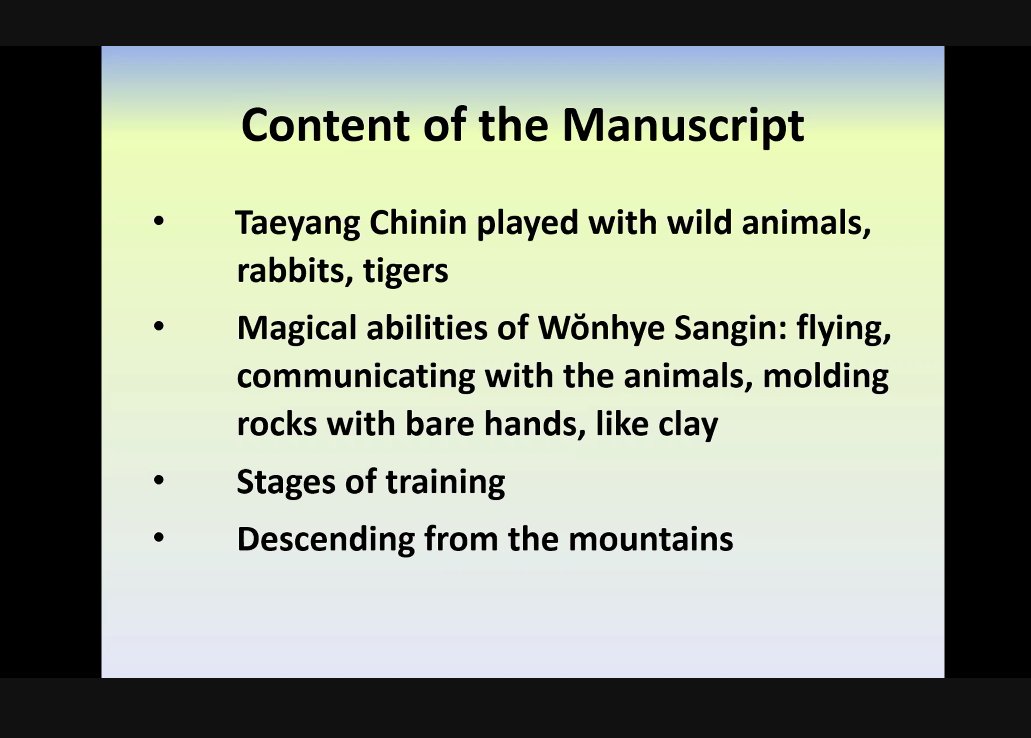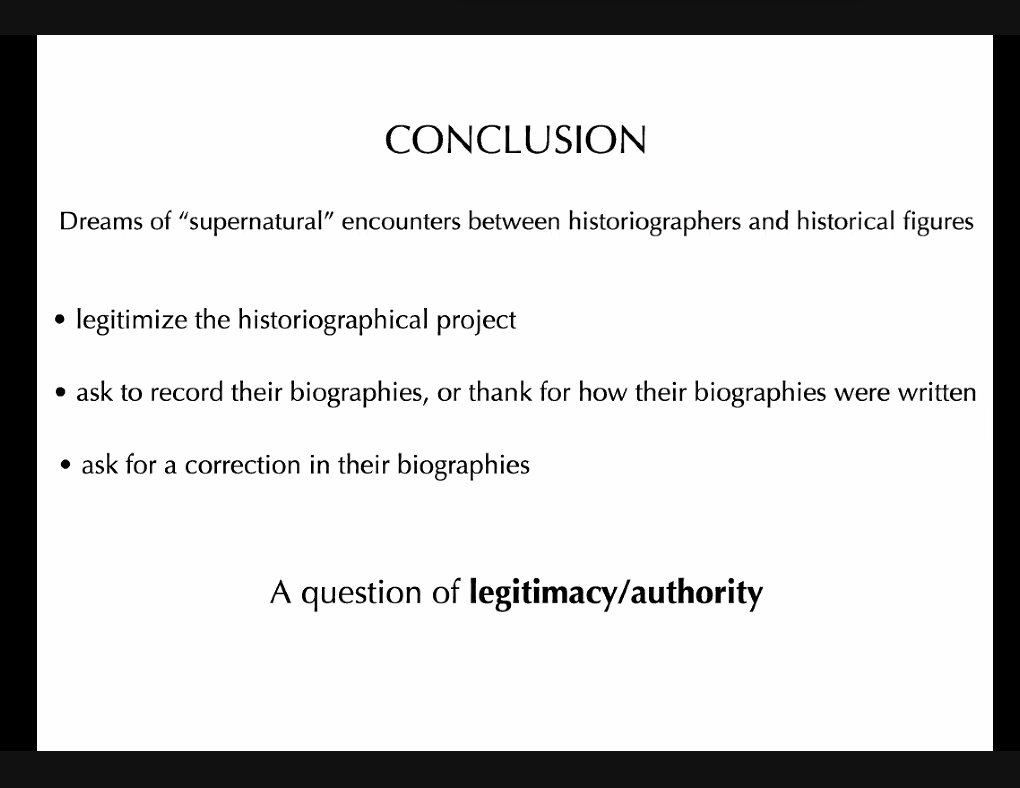There& #39;s an academic symposium happening online this weekend on "Writing the Supernatural into History in Pre-Modern East Asia" - if I can manage the time difference I& #39;ll probably try to make it out to at least some of these talks. https://www.asianstudies.org/wp-content/uploads/Writing-the-Supernatural-into-History-Panel-Schedule.pdf">https://www.asianstudies.org/wp-conten...
I am up making my first cup of tea and ready to the first panel I am attending at this symposium. Going to be live-tweeting interesting snippets from the event this weekend.
Currently I& #39;m listening to Huiyao Yang talk about " The Jade Disc of Qin Shi Huang: A case study of supernatural tales in early Chinese historiography" - Very interesting comments abt stories in Zuo Zhuan 左传 and Han Shu 汉书 about river gods and dieties rejecting sacrifices
The rejection of sacrifices can be read as a critique of imperial rule - for example, emperors may get their sacrifices rejected when sacrificing to gods local to certain regions that exist beyond their rule
Now listening to Dr Victoria Ten talk about "Practices of Self-Cultivation in Contemporary Korea: attitudes to an unpublished martial arts novel depicting immortals"
I& #39;m really intrigued by the similarities between this unpublished yet influential Korean martial arts novel and Chinese wuxia/xianxia novels as well as their predecessors
For folks who are interested in Korean martial arts and martial arts novels, Dr. Ten has written a book about this topic https://www.google.ca/books/edition/Body_and_Ki_in_GiCheon/anj4DwAAQBAJ?hl=en&gbpv=0">https://www.google.ca/books/edi...
Haha someone else is thinking of similar things and also brought up wuxia
Now there is a discussion about how martial arts and self-cultivation are connected to both discipline and gaining power, resistance to political structures - even codes around overthrowing rulers
Now there is a discussion about how martial arts and self-cultivation are connected to both discipline and gaining power, resistance to political structures - even codes around overthrowing rulers
Okay I& #39;m done for today - planning to drop by 2 more panels tomorrow so check back then :)
At the symposium again... now listening to Dr Olga Bonch-Osmolovskaya& #39;s talk on "Power and
the Supernatural in Western Han (206 CE–25 AD) Political Discourse"
the Supernatural in Western Han (206 CE–25 AD) Political Discourse"
I am appreciating the comments here about the relationship of the the canonical (Confucianism) and the supernatural, and how this evolved in the Western Han
Also, I& #39;m thinking a lot about this quote:
“子不语怪,力,乱,神”
Also, I& #39;m thinking a lot about this quote:
“子不语怪,力,乱,神”
Next, Dr Anthony Terekhov& #39;s talk on "Auspicious Omens in Han Apocryphal Texts"
I have been looking forward to this one because I have been thinking a lot about the presence of omens in xianxia and supernatural tales and their political implications
I have been looking forward to this one because I have been thinking a lot about the presence of omens in xianxia and supernatural tales and their political implications
The speaker talks about how apocryphal texts are used to "justify the rule" of the emperor (I feel like this is a running theme that we& #39;re seeing)
I will have to look up some primary source quotes about the omens - here are some conclusions the speaker draws
I will have to look up some primary source quotes about the omens - here are some conclusions the speaker draws
Georgijs Dunajevs talking about "Tang Xuanzong and His Court in Official and xiaoshuo sources on the Eve of the An Lushan Rebellion"
it& #39;s interesting to think about how prose records and xiaoshuo (fiction) approach the same time period and events in different ways
it& #39;s interesting to think about how prose records and xiaoshuo (fiction) approach the same time period and events in different ways
some differences between then:
- shifts from historical to semi-historical/fictional protagonists
- shifts from cause/effect to predeterminism
- shifts from established facts to unproven claims
again, implications about how fictional accounts of history can be politicized
- shifts from historical to semi-historical/fictional protagonists
- shifts from cause/effect to predeterminism
- shifts from established facts to unproven claims
again, implications about how fictional accounts of history can be politicized
taking a break now! will be back in 20 minutes for the last panel, which includes two speakers talking about the supernatural in history and gender issues, so that should be pretty interesting
Okay, now Dr Aude Lucas talking about "Dreams of Past Heroes: how historical figures appeared to historiographers in Chinese 18th-century “pen jottings” (biji 筆記)"
The speaker is talking about the "biji" 笔记 genre - “pen jottings” (a type of prose records) - that exists in a space between the real and the fictional [fun aside, a lot of supernatural tales and anecdotes exist in biji form, for folks interested in reading source texts]
The talk is focused on the “supernatural” dreams of historiographers in The Master Does Not Speak (子不语), a biji, where historical figures appear in dreams to offer their perspectives on history and correct inaccuracies and stuff  https://abs.twimg.com/emoji/v2/... draggable="false" alt="👻" title="Geist" aria-label="Emoji: Geist">
https://abs.twimg.com/emoji/v2/... draggable="false" alt="👻" title="Geist" aria-label="Emoji: Geist">
omg now I& #39;m thinking of a story about an encounter between a historical figure and a historiographer in a dream based on this talk...
Ao Huang talking about "Gender and Sexual Non-normativity as the Supernatural in Early Modern China’s Gender System" - this is one of my favourite talks from the symposium because it& #39;s a really important talk that& #39;s not talked about enough
Ao Huang talks about how supernatural tales have been overlooked by queer theory and western queer theory as well as marginalized by colonialism and orientalism - some scholars dismissing and overlooking the supernatural as simple superstitions and inferior
the talk goes into details about different representations of gender and sexuality - tales that feature retribution for hypersexuality or sexual behaviours that don& #39;t fit social expectations, rewards for embodying gender norms, and trans and intersex characters
I haven& #39;t read any of the examples mentioned but for folks who are curious, the texts are:
- 姑妄言
- 孝女化男
- 閩都別記
- 姑妄言
- 孝女化男
- 閩都別記
Finally, Zhujun Ma& #39;s "Female Agency in the Pilgrimage of Bixia yuanjun in the Vernacular Literature of Late imperial China"
women taking pilgrimages is seen as disrupting social order and the text tries to de-legitimize women’s pilgrimages
women taking pilgrimages is seen as disrupting social order and the text tries to de-legitimize women’s pilgrimages
okay that& #39;s it for my thread of highlights and notes - thanks for following along. I hope there are more events on this topic in the future
/end thread
/end thread

 Read on Twitter
Read on Twitter




